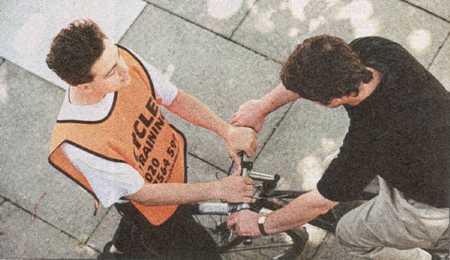| A day in the life of
a cycle Trainer
Londoners knows all about traffic and the problems it
causes. One way to beat it is to get on your bike, but that, in itself,
poses problems. "Some people are worried about cycling on London's busy
streets," says Simeon Bamford, co-ordinator of Cycle Training. "But we
can teach them how to use the roads safely and confidently. We can teach
a riding style which enables people to make lots of space around themselves
and communicate assertively with other road users to get to where they
are going switfly."
Bamford who has a degree in artificial intelligence,
first got the idea for providing cycle training in 1998 while working as
a software developer. Having secured a £2000 grant from the Scarman
Trust through the Millennium Commission, he and Vicky Carnegy, one of his
instructors and now a co-director, set up the company in July 2000.
He cycles to work each day, taking just 10 minutes to
get from his Camberwell flat to his Kennington office on his silver 21-gear
mountain bike, specially adapted for road use. He checks his e-mails and
phones instructors for booking. " he explains, adding that his job is split
between running the office and acting as an instructor.
Cycle Training has 35 freelance instructors, male and
female. Most are former couriers, students, actors or retired teachers
and all are trained to do bike fitting and maintenance checks, covering
things such as gears, brakes and wheels.
Bamford has always loves cycling and, although he learned
to drive as a teenager, he has never owned a car. "I lived in the New Forset
and always cycled to school. I cycled at the university and when I went
to Poland for a year to teach English. I cycled when I was there. When
I got a job in London I cycled from Peckham to the Office in Covent Garden.
"Cycle Training runs individual and group courses (the latters usually
in schools) covering complete heginners to journey accompaniment (helping
cyclists plan their best route to and from work). With an estimated 160,000
regular cyclists in London and growing concerns about congestion and pollution,
he is increasingly kept busy running courses for local authorities. "Ealing
council has provided training funding for young adults, while Tower Hamlets
council has provided training for staff. And we run courses at summer universities
at Hackney, Newham. Isington and Westminster."
In the afternoons you will often find him pedalling off
to supervise training in schools, mainly primary. "Once we've arranged
things with the head we'll go into the school to give a talk at the assembly
in order to get the children interested. We usually find the kids know
the reasons why it's good to cycle. Most of them are really into it. But
a lot of kids end up not cycling because parents or teachers don't let
them. We can turn that around."
Over four weeks, children are taught to cycle safely
and the training is made fun. "The kids often cycle for a mile. We will
stop at junctions and practise manoeuvres and then ride on to another junction.
They really enjoy it because it's different to normal lessons."
But what about the Elephant and Castle and Marble Arch?
"People tend to prefer cycling in side streets," he admits. "But when you
learn to cycle confidently you use all the arterial roads."
Surprisingly, he is not a supporters of cycle networks.
"A lot of money in London is being spent on creating cyle lanes byt it's
unecessary and they sometime cause more problems than they solve. Cycle
lanes marginalise cyclists and give a false impression that they shouldn't
be on the road."
And he rejects the use of safety gear. "Some people see
cycling as a dangerous sport. It's not," he claims. "It's a simple and
easy way to get around. All you need is a bike. We say you don't need a
helmet or anything else. If you wear a suit, cycle to work with a suit."
Bamford works a 9am to 5pm day but he will often stay
late at the office, catching up on administration. He doesn't mind. "We're
not doing it for money. We are all doing it because we believe in the promotion
of cycling. Having said that, it's a new market with enormous potential."
He says more of us should abandon the car and public
transport. "Companies are going to have to produce a green transport plan
and there are likely to be disincentives for workplace parking and tax
incentives for employees cycling to work.
"Employees who cycle regularly are known to be more punctual
and take less time off sick. It is in an employer's interest to promote
cycling among staff."
More Londoners, he hopes, will take a lead from the Dutch.
"In Holland everyone cycles. It's the sheer number of cyclists that make
cycling safe and pleasant to everyone. If more people cycled, London would
be more pleasant, safer, cleaner and less stressful." |


